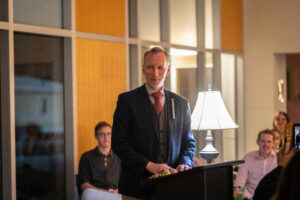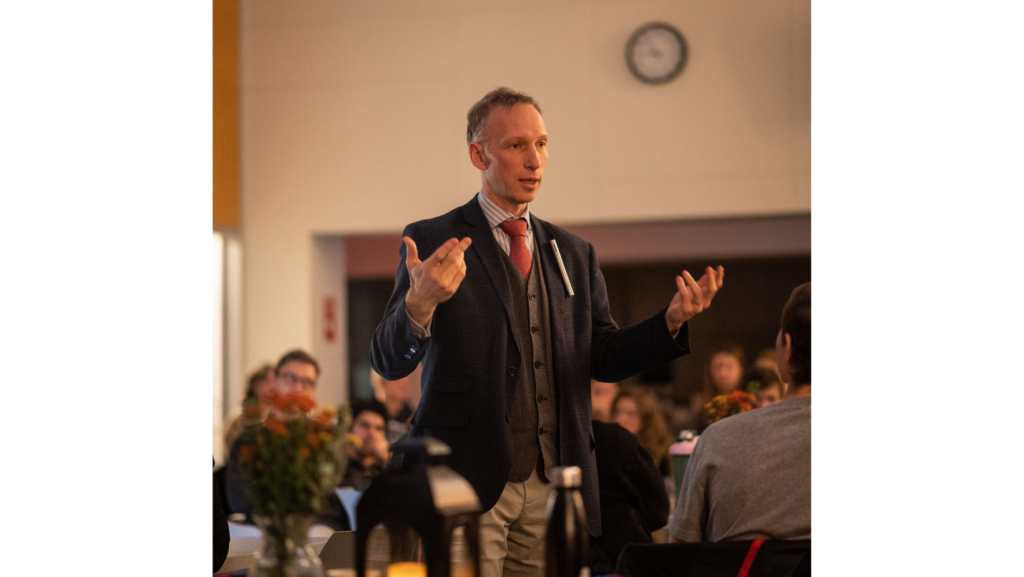Dr. Ryan Topping’s new book paints a vision of how the intellectual rigor, emotional conscientiousness, and aesthetic beauty of an authentic Catholic culture will have the natural magnetism to draw a new generation toward the Catholic Church.
Using the wisdom of St. John Henry Newman as its guide, Thinking As Though God Exists: Newman On Evangelizing The “Nones” walks the reader through a variety of approaches to evangelization which are honed to the felt needs of a young adult culture that is steeped in nonchalant atheism and a noncommital stance towards religion.

Topping explains how to articulate why it is reasonable to “think as though God exists,” to an audience that takes public atheism for granted. He also describes just how appealing the Gospel becomes when it is presented by Catholics who embody a culture that is not only a culture of words, but also a culture of incarnate joy and beauty.
St. John Henry Newman’s “integrative habit of mind” is a main theme throughout the book, with Topping making a case for intellectual and spiritual integration as an antidote to the anxiety and cognitive dissonance which marks much of modern society.
Thinking As Though God Exists is a broad blueprint for what an authentic Catholic culture could – and does already – look like. It is a culture grounded by a compassionate approach to mental health, a new renaissance of Catholic arts and architecture, thoughtful and swift rebuttals to anti-Christian myths, and a renewal of post-secondary education that is free of careerism and what Topping articulates as the false promises of social activism.
The book concludes by making a thoughtful and passionate case for why the flowering of a new liberal arts culture within universities is key to evangelization in our present era.
Going beyond idealism, Thinking As Though God Exists is a practical guide with the potential to move the reader beyond poetic appreciation and into concrete action.
We had the chance to speak with Dr. Topping about his book, the importance of liberal arts in the New Evangelization, and his own thoughts on how Catholic culture is coming alive in the Archdiocese of Edmonton.
*
*
Dr. Topping, you wrote about the sense of “dread” and existential weariness that marks the experience of many youth and young adults in our present culture. You propose that joy is a particular antidote. Why are we in a joy deficit?
Well, man is made in God’s image, and the intellect is the highest part of who we are as people. And the intellect is directed to truth. So without truth, it’s impossible to fulfill our end as human beings.
So when you have a cultural situation where you’re told that truth is not possible to obtain, then sadness inevitably follows. Why? Because your very purpose as a human being is frustrated.
What are some experiences of joy in your own life?
I’d say two things. One, is through family life. I think that’s a constant source of joy. Well, and through liturgy. If I couldn’t, for some reason, be a part of a worshiping community that took liturgy seriously, I think I would wither.
When I was still a Protestant, I originally moved towards atheism because the lack of liturgy was withering, so I can sympathize, I can relate to that lack of joy for sure. If it didn’t feel like you could worship God, well then, the springs of joy would start to dry up.
You write that “liberal [arts] education grants to rich and poor a passport that allows the pilgrim to travel to beautiful lands that will bring him back to his own time and place refreshed and invigorated.” In an age of existential boredom and anxiety, why do you present the liberal arts as something specifically refreshing?
Well for a similar psychological reason as I mentioned before about why truth makes us happy because we’re ordered, as human beings, to know things.
The liberal arts give you access to the whole of reality. They give you a taste of the whole.
When you are trapped in an age of relativism, you live under a very low ceiling. And increasingly, all you get to know is yourself. And then there is the experience living with the habits that social media produce where people are constantly looking at each other, looking at themselves, worried about how they look. . . So you look at yourself to much. And then you realize, I hate myself. I’m not satisfying for myself, and nor is anyone else.
There is an idolatry there, an idolatry of self. Because we can’t help but worship. And if you don’t have a transcendent God, then you’re going to fall in love with an imminent one. And he or she won’t satisfy.

Why do the liberal arts free people? Why do you believe that the liberal arts bring people closer to Truth, the Truth we are made for?
The liberal arts give us access to the full panorama of truth. Because education is disintegrated in modern academia, you might get good at one kind of knowledge, while you virtually ignore the other. And then you don’t get to see the whole panorama of reality.
Liberal arts give you access to the wide vista of what is possible to be done. And eventually, the liberal arts lead you to God, who is the cause of all being, all reality.
Throughout the book, you refer to architecture and physical beauty and how these physical manifestations of beauty impact the way that we think. As Catholics, is it important is it for us to intentionally make our workspaces, our churches and our homes beautiful?
We only take care of those things that we love.
And if we have a rightly ordered life, the kind of life that Pope Leo XIII talked about in his encyclical Rerum Noverum, then we have a series of concentric loves that begin with the family, your husband or wife, your children, and moves outwards.
There is an interlocking sequence of arms that hold societies together. Modern society wants to eliminate all of that and reduce everything to just the state and the individual, and nothing else matters.
When you do that, humans find themselves as homeless, because it becomes just about the impersonal state or the isolating self.
If it’s just the state and the individual – forget about the other layers of humanity like family, friendship, community, etc. – it becomes much harder to love.
And it’s impossible to make beautiful things that you don’t love.
One of the reasons why cities are so ugly, is because we don’t love where we live! And we don’t love where we live, because we don’t have the experience of love, which begins with family life. So these problems are all interconnected.
So it’s less about Catholics making their spaces beautiful and more about focusing on that encounter with love. When people encounter spaces and people marked by love, they are drawn to the tenderness and intentionality.
Yes. Beauty has nothing to do with money, although money can help express certain forms. So for example, when you take a practical problem of why are churches banal, it’s not because we lack money.
If you look at churches built in Canada, and the U.S. prior to 1950, it’s all built on the backs of immigrants. Catholicism in Canada in the English-speaking realms, it’s an immigrant phenomenon. And these immigrants were all much poorer than we are. And yet their churches were gorgeous and sumptuous because they made sacrifices for them.
We don’t have beautiful churches because our love is looser and weaker. So we’re happy with cheap, utilitarian designs. Your external environment will reflect your inner environment.
So the beauty of Christian architecture obviously wasn’t built as an “evangelization strategy,” it was a natural outflowing of what was reflected in the heart of the architect, which was a great love of Christ and Catholicism.
Right. So how does this relate to evangelization? When we talk about beauty and liturgy, some people say, ‘Well if we just had beautiful liturgies, then everyone would convert’, right?
Well, I do think a lot more people would convert if more liturgies were beautiful, right? But that’s not why we do them. The reason why I do it is because God is worth loving well, and so you, as the psalmist says, you give everything up to those things that are most important.
The main thing is to revive our loves. If you love well, then you’re going to work well. Everything else flows from that.
I thought a central theme of the book was Newman’s idea of the “integrated habit of mind.” Many of us grew up with our faith, entertainment, and politics disintegrated, even removed from one another. We are torn between the conflicting philosophies that have formed us. What would your advice be to someone who wants to integrate their life as a Catholic?
My advice would be to go on a silent retreat for 30 days. When you get sick, you often need a time of purging. And almost all of us need that in a dramatic way, because of what you described very well, that we have barnacles attached to us from whence we know not where.
Why do I feel this way? Why do I think this way? Why do I like this kind of music? And it’s almost impossible to sort out, actually, without an experience of cleansing. So that’s what I would recommend – if not for 30 days, go to a monastery for a week. And don’t have your phone and see how you feel at the end of that.
After that, get a spiritual director. So you can get to work in a systematic way of going through your passions and through your habits. And then go find a pocket of people that are interested in the same project as you are. Because it’s impossible to be free unless you are doing it with the support of other people.
When it comes to evangelizing this present culture, what is an example in the Archdiocese of Edmonton where you have seen beauty bringing people to Christ?
One would be the Family Life Conference at Lac Ste Anne. I think that’s a dramatic exercise in Catholic solidarity and a joyful, evangelical witness. It is a place of great friendship.
First of all, if you don’t have friendship and love, how can you worry about the poor? If you hate your friends, or you don’t have true friendships, how are you worrying about other people who are not your friends? You’re not going to do them well. So yes, I think the Family Life Conference is a very inspiring phenomenon. That is not the sort of thing that happens almost anywhere else.
To purchase Ryan Topping’s new book, see here. Be sure to leave a review on Amazon once you’ve read the book!
*
*
Dr. Ryan Topping is a Professor of Theology and serves as Director of the Benedict XVI Institute for the New Evangelization at Newman Theological College, where he also previously served as Academic Dean. To date, he has published 10 books on Catholic culture and education, including Rebuilding Catholic Culture: How the Catechism Can Shape our Common Life (2012), and his latest book is Thinking as Though God Exists: Newman on Evangelizing the Nones (2023). Dr. Topping and his wife have 10 children.
(This interview has been edited for clarity and brevity)
Jenny Connelly – Archdiocese of Edmonton

